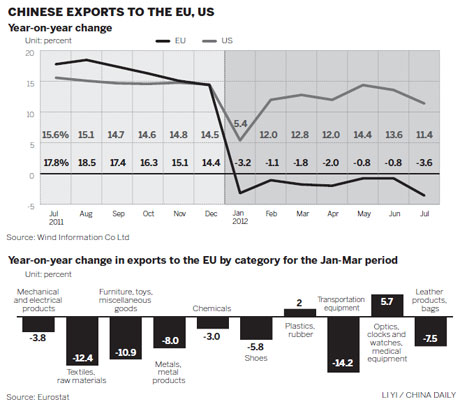

Chinese exports to the EU accounted for 17.1 percent of the nation's total exports during the first half, down from 20 percent in 2010. Neither corporate executives nor researchers are sanguine about the outlook for the second half.
"The situation remains very severe considering the possibility of a double-dip recession in eurozone economies in the coming months," said Yao Ling, a senior researcher at the Chinese Academy of International Trade and Economic Cooperation, affiliated with the Ministry of Commerce.
"We cannot exclude the possibility that China's exports to the EU will grow in the second half, but this will be very hard to achieve," said Yao.
Zhang Guojian, vice-executive secretary of Guangdong Chamber of Commerce for Imports and Exports of Private Enterprises, agreed.
"We cannot see any signs of recovery for China's shipments to the region in the short term, as the EU market will continue to be slack, probably into the first quarter of next year," Zhang said.
"The European market is so weak that we have had to take all sorts of measures to cut costs since the first quarter of this year," said Zhang Guanjin, manager of Shaoxing Jinyong Textile Co Ltd in Zhejiang province.
"Many textile exporters in Zhejiang are challenged by high costs, and orders have also been declining, as some European clients transfer their orders to Southeast Asia to take advantage of lower labor costs," he said.
Shaoxing Jinyong shifted its focus toward the domestic market two years ago, and 50 percent of its sales now come from the domestic market.
Early this year in his annual Government Work Report, Premier Wen Jiabao set a target of 10 percent for the nation's foreign trade growth this year.
Customs officials said recently that, due to the shrinking global demand and increasing costs, the fundamentals for the recovery of the nation's foreign trade are "not stable".
Gao Hucheng, vice-minister of commerce, said last week that the pressures on the Chinese government to achieve the 10 percent target are "growing", amid the worsening eurozone debt crisis.
Yao predicted that the growth of China-EU trade would be "far below" the national level of 10 percent, dragging down Chinese exports, despite the fairly healthy growth in Chinese imports from the bloc.
The outlook for the eurozone economy remains troubled. The debt woes which started in Greece have spread to other European nations, including Ireland, Portugal and Spain.
Spanish unemployment in the second quarter hit its highest level of 24.6 percent since the mid-1970s, and the number of unemployed Spaniards reached 5.7 million, giving the country the highest proportion of people out of work in the EU.
Moody's Investors Service recently changed its outlook for Germany, the Netherlands and Luxembourg from stable to negative, which has dampened economists' confidence in the eurozone and added to uncertainty over its prospects for recovery.
On top of the decreasing demand, trade investigations by European nations are adding to Chinese exporters' woes.


 Washington to remain focused on Asia-Pacific
Washington to remain focused on Asia-Pacific RQFII target blue chips amid bear market
RQFII target blue chips amid bear market Australian recall for top two exporters
Australian recall for top two exporters China fears new car restrictions
China fears new car restrictions